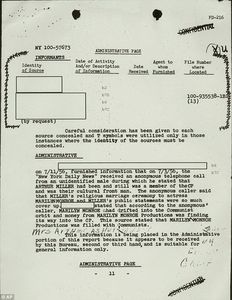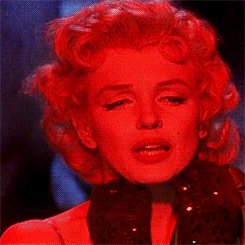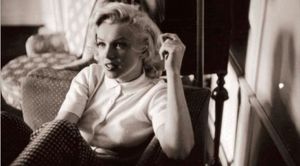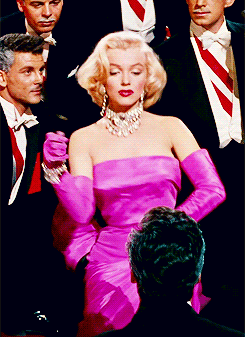Comment le FBI espionnait la vie privée de Marilyn Monroe
Comment le FBI espionnait la vie privée de Marilyn Monroe
publié le 30 décembre 2012
en ligne sur atlantico.fr
L'actrice était suspectée de sympathiser avec le communisme depuis son mariage avec le dramaturge Arthur Miller.
Un document top secret rendu public par le FBI révèle comment l'agence américaine gardait un œil en permanence sur l'actrice mythique Marilyn Monroe. Pourquoi un tel intérêt ? La star était suspectée d'entretenir des relations ambiguës avec le communisme ennemi depuis l'année 1956.
Un appel anonyme reçu au New York Daily News cette année-là avait alerté sur le fait que le dramaturge Arthur Miller était un communiste et que Marilyn était "attirée dans l'orbite du communisme" depuis son mariage avec lui plus tôt dans l'année. Mais le FBI en savait bien plus sur la star lorsqu'elle est morte en 1962. C'est pourquoi l'Associated Press mène une campagne afin que soient diffusé davantage de documents du FBI, afin de faire toute la lumière à l'occasion de l'année des 50 ans de la mort de la belle blonde.
Le document par lequel le scandale arrive stipule que le 11 juillet 1956, l'appel anonyme a divulgué des informations au sujet de la société de Monroe, Marilyn Monroe Production, qui, selon l'auteur anonyme de l'appel, était "un nid à communistes". L'argent de l'entreprise aurait également été utilisé pour financer des activités communistes. Le mystérieux interlocuteur a expliqué que le mariage de l'actrice lors d'une cérémonie juive à peine un mois avant n'était qu'un nuage de fumée, une "couverture" destinée à détourner l'attention. Miller était selon l'interlocuteur encore membre du parti communiste, et représentait la tête pensante du groupe. Le document classé, s'il a été rendu public, reste écrit avec une lourdeur administrative qui en rend la lecture très rébarbative.
Le document classé, s'il a été rendu public, reste écrit avec une lourdeur administrative qui en rend la lecture très rébarbative.
Le FBI prétend posséder d'autres fichiers secrets sur l'actrice et ne pas pouvoir les divulguer. Sa version la plus récente est disponible sur le site The Vault, qui publie régulièrement des fichiers concernant les célébrités, les responsables gouvernementaux, les espions et les criminels.
Mais l'agence AP argue que le FBI n'a jamais donné de véritable arguments pour justifier une telle censure, et n'a fournit "aucune analyse factuelle ou légale des dangers à prévoir en cas de divulgations de tels fichiers."
L'aura de Marilyn Monroe en tant qu'icone culturelle et les peurs qu'elle puisse être recrutée par le parti communiste ou conduit le FBI alors dirigé par J. Edgar Hoover a surveiller ses fréquentations, ses activités, ses voyages, les associations auxquelles elle participait. Les fichiers, qui démarrent en 1955, recherchent de potentiels signent d'une "gauchisation" de la star.
The FBI's secret file on Marilyn Monroe: Document that shows agency kept track of intimate details about actress
publié le 28 décembre 2012
en ligne sur DailyMail
A classified file released by the FBI shows how the agency tracked Marilyn Monroe's suspected ties to communism in 1956.
The agency documented an anonymous phone call to the New York Daily News that year warning that playwright Arthur Miller was a communist and Monroe had 'drifted into the communist orbit' after her marriage to him earlier that year.
The file is just one piece of the puzzle about what the FBI knew about the actress when she died in August 1962.
The Associated Press waging an ongoing campaign to have more of the FBI documents released by the agency, coinciding with the 50th anniversary Monroe's death.

Being watched: Marilyn Monroe and her husband, playwright Arthur Miller were both suspected of communist activities by the FBI.
The redacted document reveals that on July 11, 1956, the agency got a tip that an anonymous male caller phoned the Daily News to report that the actress's company, Marilyn Monroe Productions, was 'filled with communists' and that money from the company was being used to finance communist activities.
The caller said Miller's marriage to Monroe during a Jewish ceremony less than a months earlier was a 'coverup.'
Miller, the man said, 'was still a member of the CP (communist party) and was their cultural front man.'
The FBI has long made portions of its documents about Monroe public, but most of them are heavily redacted.

Surveillance: This FBI file documented an anonymous call to the New York Daily News. It's unknown how the agency found out about it
However, the FBI claims it has lost its files on the actress and cannot release them.
Finding out precisely when the records were moved - as the FBI says has happened - required the filing of yet another, still-pending Freedom of Information Act request.
The most recent version of the files is publicly available on the bureau's website, The Vault, which periodically posts FBI records on celebrities, government officials, spies and criminals.
The AP appealed the FBI's continued censorship of its Monroe files, noting the agency has not given 'any legal or factual analysis of the foreseeable harm that might result from the release of the full records.'

Marilyn Monroe is seen here with Jean Pierre Piquet, manager of Continental Hilton Hotel. The FBI has released a new version of files it kept on Monroe that reveal the names of some of her acquaintances who had drawn concern from the FBI

The star's death was ruled likely drug overdose, but questions still remain about the FBI's role in her life
Monroe's star power and fears she might be recruited by the Communist Party during the tenure of longtime FBI Director J. Edgar Hoover led to reports being taken on her activities and relationships, including her marriage to playwright Arthur Miller.
Monroe's file begins in 1955 and mostly focuses on her travels and associations, searching for signs of leftist views and possible ties to communism. The file continues up until the months before her death, and also includes several news stories and references to Norman Mailer's biography of the actress, which focused on questions about whether Monroe was killed by the government.
There have been two major government investigations into Monroe's demise - the original inquiry immediately after her death and another effort by the Los Angeles District Attorney's Office in 1982. The second inquiry, released in December 1982, reviewed all files available investigative reports, including files compiled by the FBI on her death. The records, the DA's office noted, were 'heavily censored.'
That mention intrigued the man who performed Monroe's autopsy, Dr. Thomas Noguchi. While the DA investigation concluded he conducted a thorough autopsy, Noguchi has conceded that no one will likely ever know all the details of Monroe's death. The FBI files and confidential interviews conducted with the actress' friends that have never been made public might help, he wrote in his 1983 memoir 'Coroner.'
'On the basis of my own involvement in the case, beginning with the autopsy, I would call Monroe's suicide "very probable,"' Noguchi wrote. 'But I also believe that until the complete FBI files are made public and the notes and interviews of the suicide panel released, controversy will continue to swirl around her death.'

/image%2F1211268%2F20240315%2Fob_782fd3_banner-mm-2024-03-spring-5.jpg)
/image%2F1211268%2F20240410%2Fob_40c4f9_blog-gif-mm-niagara-1-3.gif)

/image%2F1211268%2F20240417%2Fob_0b0d56_2024-03-lee-mexique.jpg)
/https%3A%2F%2Fstorage.canalblog.com%2F19%2F65%2F312561%2F91436129_o.jpg)
/https%3A%2F%2Fstorage.canalblog.com%2F57%2F63%2F312561%2F127743382_o.jpg)
/https%3A%2F%2Fstorage.canalblog.com%2F98%2F05%2F312561%2F84823731_o.jpg)
/https%3A%2F%2Fstorage.canalblog.com%2F01%2F63%2F312561%2F84814201_o.jpg)
/https%3A%2F%2Fstorage.canalblog.com%2F66%2F21%2F312561%2F82823948_o.jpg)
/https%3A%2F%2Fstorage.canalblog.com%2F32%2F31%2F312561%2F124125043_o.jpg)
/https%3A%2F%2Fstorage.canalblog.com%2F31%2F08%2F312561%2F71448014_o.jpg)
/https%3A%2F%2Fstorage.canalblog.com%2F34%2F90%2F312561%2F81829009_o.jpg)
/https%3A%2F%2Fstorage.canalblog.com%2F18%2F35%2F312561%2F61120383_o.jpg)
/image%2F1211268%2F20240410%2Fob_9f471d_blog-gif-mm-syi-1.gif)



/image%2F1211268%2F20240417%2Fob_5234cf_centrafrique-2023-stamp-1-1.jpg)
/http%3A%2F%2Fstorage.canalblog.com%2F07%2F62%2F312561%2F134213691_o.jpeg)
/http%3A%2F%2Fstorage.canalblog.com%2F23%2F75%2F312561%2F133764841_o.jpg)
/http%3A%2F%2Fstorage.canalblog.com%2F44%2F02%2F312561%2F133747721_o.jpg)

/image%2F1211268%2F20240229%2Fob_66f2c6_tag-mm-public-martin-lewis-show-1.png)
/image%2F1211268%2F20240410%2Fob_07cb4a_blog-gif-mm-stern-1.gif)
/image%2F1211268%2F20240229%2Fob_143453_blog-gif-video.gif)
/image%2F1211268%2F20240301%2Fob_735dec_blog-liens-culture.jpg)

/image%2F1211268%2F20240302%2Fob_e11252_blog-liens-friends-jane.gif)